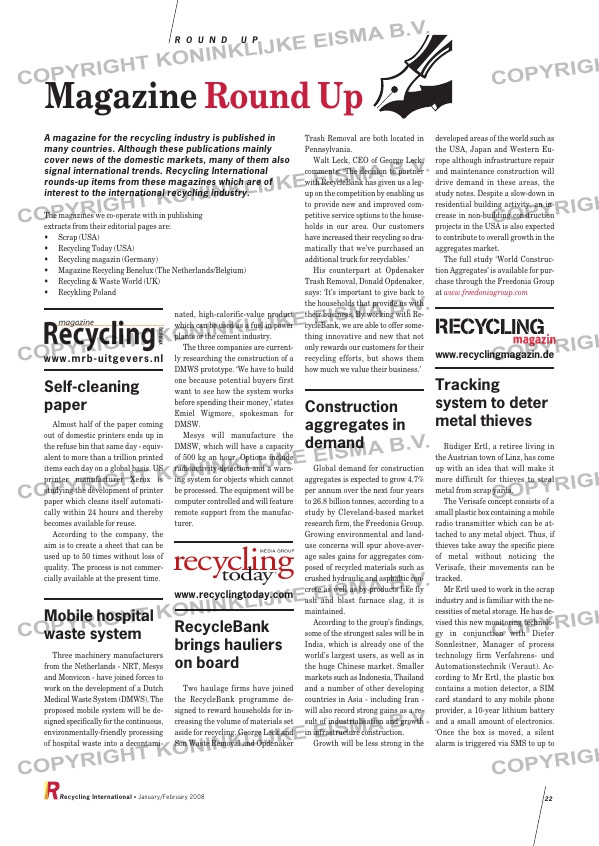Page 22 from: January / February 2008

Self-cleaning
paper
Almost half of the paper coming
out of domestic printers ends up in
the refuse bin that same day – equiv-
alent to more than a trillion printed
items each day on a global basis. US
printer manufacturer Xerox is
studying the development of printer
paper which cleans itself automati-
cally within 24 hours and thereby
becomes available for reuse.
According to the company, the
aim is to create a sheet that can be
used up to 50 times without loss of
quality. The process is not commer-
cially available at the present time.
Mobile hospital
waste system
Three machinery manufacturers
from the Netherlands – NRT, Mesys
and Monvicon – have joined forces to
work on the development of a Dutch
Medical Waste System (DMWS). The
proposed mobile system will be de-
signed specifically for the continuous,
environmentally-friendly processing
of hospital waste into a decontami-
nated, high-calorific-value product
which can be used as a fuel in power
plants or the cement industry.
The three companies are current-
ly researching the construction of a
DMWS prototype. ‘We have to build
one because potential buyers first
want to see how the system works
before spending their money,’ states
Emiel Wigmore, spokesman for
DMSW.
Mesys will manufacture the
DMSW, which will have a capacity
of 500 kg an hour. Options include
radioactivity-detection and a warn-
ing system for objects which cannot
be processed. The equipment will be
computer controlled and will feature
remote support from the manufac-
turer.
RecycleBank
brings hauliers
on board
Two haulage firms have joined
the RecycleBank programme de-
signed to reward households for in-
creasing the volume of materials set
aside for recycling. George Leck and
Son Waste Removal and Opdenaker
Trash Removal are both located in
Pennsylvania.
Walt Leck, CEO of George Leck,
comments: ‘The decision to partner
with RecycleBank has given us a leg-
up on the competition by enabling us
to provide new and improved com-
petitive service options to the house-
holds in our area. Our customers
have increased their recycling so dra-
matically that we’ve purchased an
additional truck for recyclables.’
His counterpart at Opdenaker
Trash Removal, Donald Opdenaker,
says: ‘It’s important to give back to
the households that provide us with
their business. By working with Re-
cycleBank, we are able to offer some-
thing innovative and new that not
only rewards our customers for their
recycling efforts, but shows them
how much we value their business.’
Construction
aggregates in
demand
Global demand for construction
aggregates is expected to grow 4.7%
per annum over the next four years
to 26.8 billion tonnes, according to a
study by Cleveland-based market
research firm, the Freedonia Group.
Growing environmental and land-
use concerns will spur above-aver-
age sales gains for aggregates com-
posed of recycled materials such as
crushed hydraulic and asphaltic con-
crete as well as by-products like fly
ash and blast furnace slag, it is
maintained.
According to the group’s findings,
some of the strongest sales will be in
India, which is already one of the
world’s largest users, as well as in
the huge Chinese market. Smaller
markets such as Indonesia, Thailand
and a number of other developing
countries in Asia – including Iran –
will also record strong gains as a re-
sult of industrialisation and growth
in infrastructure construction.
Growth will be less strong in the
developed areas of the world such as
the USA, Japan and Western Eu-
rope although infrastructure repair
and maintenance construction will
drive demand in these areas, the
study notes. Despite a slow-down in
residential building activity, an in-
crease in non-building construction
projects in the USA is also expected
to contribute to overall growth in the
aggregates market.
The full study ‘World Construc-
tion Aggregates’ is available for pur-
chase through the Freedonia Group
at www.freedoniagroup.com
Tracking
system to deter
metal thieves
Rüdiger Ertl, a retiree living in
the Austrian town of Linz, has come
up with an idea that will make it
more difficult for thieves to steal
metal from scrap yards.
The Verisafe concept consists of a
small plastic box containing a mobile
radio transmitter which can be at-
tached to any metal object. Thus, if
thieves take away the specific piece
of metal without noticing the
Verisafe, their movements can be
tracked.
Mr Ertl used to work in the scrap
industry and is familiar with the ne-
cessities of metal storage. He has de-
vised this new monitoring technolo-
gy in conjunction with Dieter
Sonnleitner, Manager of process
technology firm Verfahrens- und
Auto mationstechnik (Veraut). Ac-
cording to Mr Ertl, the plastic box
contains a motion detector, a SIM
card standard to any mobile phone
provider, a 10-year lithium battery
and a small amount of electronics.
‘Once the box is moved, a silent
alarm is triggered via SMS to up to
www.recy cling mag a zin.de
A mag a zine for the recy cling indus try is pub lished in
many coun tries. Although these pub li ca tions main ly
cover news of the domes tic mar kets, many of them also
sig nal inter na tion al trends. Recycling International
rounds-up items from these mag a zines which are of
inter est to the inter na tion al recy cling indus try.
The mag a zines we co-oper ate with in pub lish ing
extracts from their edi to ri al pages are:
• Scrap (USA)
• Recycling Today (USA)
• Recycling mag a zin (Germany)
• Magazine Recycling Benelux (The Netherlands/Belgium)
• Recy cling & Waste World (UK)
• Recykling Poland
R O U N D U P
Magazine Round Up
www.mrb-uit gev ers.nl
www.recy cling to day.com
Recycling International • January/February 2008 22
RI_020 Round Up:Round Up 24-01-2008 09:33 Pagina 22



